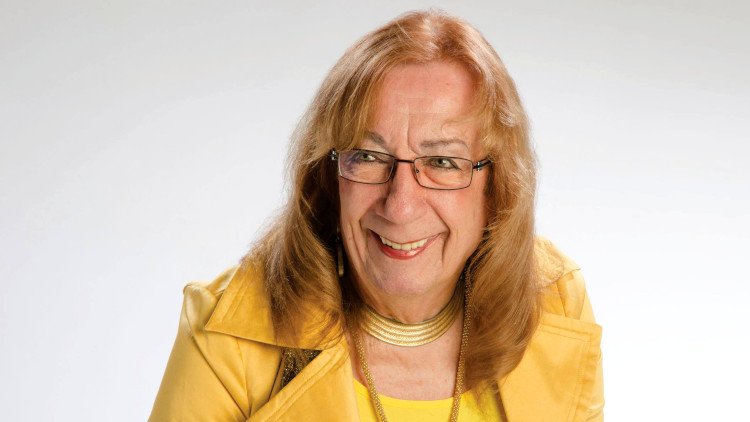Celebrating the career of transgender trailblazer Barbara Satin
Barbara Satin, a transgender activist who has worked on issues of aging, faith, and gender justice, has retired from a long and successful career in advocacy as Faith Work Director at the National LGBTQ Task Force.
“Barbara Satin’s contributions to the movement are innumerable and will be felt for generations to come,” said Kierra Johnson, Executive Director of the National LGBTQ Task Force. “You only need to be in the room with her for moments to feel the power of her presence and authenticity. Listening to her words reveals the depth of her love for people and her conviction in the belief that justice is not only possible but inevitable. Truthful and compassionate, fierce, and rooted, visionary and practical – Barbara seems to effortlessly lead with integrity and a balance not exhibited by many. It has been an honor working with and learning from her. On behalf of the Task Force and with great appreciation, we thank Barbara for helping us bring out our best for each other and the community!” concluded Johnson.
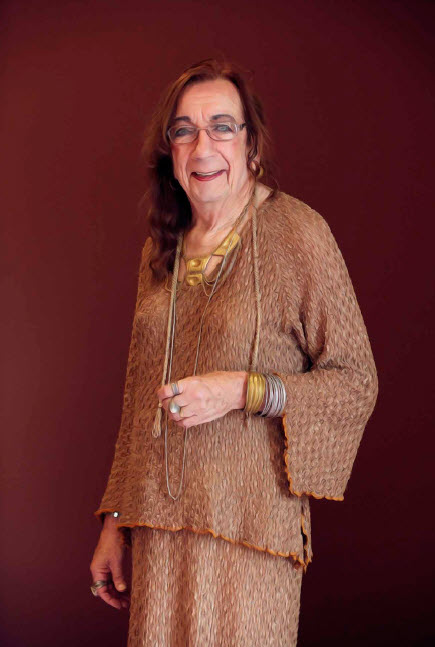
Satin was born in 1934 in St. Paul, Minnesota. Her father died soon after, leaving her mother to raise four children with the help of supportive relatives. Roman Catholicism was deeply engrained in the family; all the children went to Catholic schools and the church was an important part of their daily lives. Raised as a boy, Satin was aware of her gender difference at an early age but had no vocabulary or ideas with which to understand and address it. She only knew that she needed to hide her differences to survive.
After two years as a young teenage seminarian, Satin attended Catholic high school, studied at a local Catholic college, and was impacted by the story of Christine Jorgensen, whose sexual reassignment surgery in Denmark in 1953 made headlines around the world.
Satin received a commission as an officer in the U. S. Air Force, was given a medical discharge, returned to St. Paul, and fell in love and hoped that marriage and children would bring an end to her gender issues. She was a prominent leader in the Roman Catholic Diocese and a well-respected civic activist. At age 54, Satin took early retirement and began to explore her transgender identity, moving out of the family home and discovering the Spirit of the Lakes Church in Minneapolis. There she became part of the United Church Coalition for LGBTQ Concerns (now the Open and Affirming Coalition of the UCC). Satin served on the denomination’s Executive Council as its first openly transgender member and played a role in the church’s 2003 decision to affirm the inclusion of transgender people in the full life and ministry of the church.
For the past 21 years, Barbara has convened the Transgender Day of Remembrance in Minneapolis/St. Paul. On 2014, Satin spearheaded the creation of the Trans Seminarian Leadership Cohort, still the only program of its kind and thriving as part of the National LGBTQ Task Force’s faith work. In 2015, Satin was invited to the White House to talk to the Administration about housing concerns for LGBTQ seniors and she was one of three LGBTQ people invited to participate for the first time in the White House Conference on Aging. Satin has also been a board member of several non-profits that serve LGBTQ people in the areas of community activism, philanthropy, training of senior care providers and HIV/AIDS services. President Barack Obama appointed Satin to the Presidential Council on Faith Based and Neighborhood Partnerships in 2016 and in 2021, she was a prayer leader for President Biden’s Inauguration Breakfast.
We caught up with Satin to gather her thoughts on her brilliant career.
Your life’s work is very impressive and necessary to our communities. When you look back at your time with the Task Force, what were the main achievements that give you a real sense of Pride?
Jan. 2007 Interim Faith Work Director (Maternity Fill for Rebecca Voelkel
Jan. 2008 Receiving the Task Force’s Allan Morrow Award for Aging Advocacy
Apr. 2009 Wrote and published transACTION curriculum for faith communities
June 2011 Keynote speaker for United Church of Christ Coalition for LGBT Concerns
Nov. 2014 Inaugural Trans Seminarian Leadership Cohort gathering
Sep. 2013 Spirit on Lake Senior Housing project opens
Feb., 2015 Presenter to White House Senior Housing Conference
July 2015 Delegate to White House Conference on Aging
June 2016 Appointed by President Obama to his Council on Faith Based and Neighborhood Partnerships
Jan. 20, 2021 Selected as a prayer leader for President Joe Biden’s Inauguration Breakfast
Feb. 1, 2021 Named Faith Work Director for the National LGBTQ Task Force
You began this important work when most people are thinking about slowing down and withdrawing from the workforce. What are the advantages of joining an organization when you are an older person?
In my case, I had a better understanding of who I was — from the standpoint of my gender identity and expression — plus a full, successful 30 year career in corporate public relations which shaped my skills and style of interacting with others. I had also reached a point in my life where I was no longer anxious about my career future. Now I was looking for an opportunity to share those skills in an effort to help others understand what it means to be a trans woman of age who had deep faith roots. I wanted to work on raising up all three of these identities – faith, aging and gender identity/expression – both as individual traits but also having people understand them as a collective whole as embodied in my life.
Much of the world still believes that Divinity is incompatible with self-determined gender identity and sexual orientation. What have you discovered in your journey that reaffirms there is room for all to worship authentically?
I can’t accept the premise that gender identity or sexual orientation are self-determined. That relegates our queer lives to simply an individual choice. I can tell you from my personal experience — and the stories of countless queer folk — that my gender non-conformity was a part of me from as far back as I can remember, from 4 or 5 years old.
I knew, well before puberty, that I had feelings that I didn’t see modeled by other young boys. There were no resources available to help solve my conundrum, so I did what most of my peers did: hide my identity and work to create a shield of masculinity that no one could penetrate. (I have often told others that in a national crisis I could easily raise among my peers a brigade of transgender marines — because we were so intent of hiding our gender non-conformity that we sought out the most macho ways to avoid detection. In my case, I went into the air force to be a jet pilot).
A few years after I retired, my second oldest son, a psychotherapist, was concerned about a change in my behavior and asked me about it over beer and a hamburger. I said, “Jamie, I will tell you something I have never told anyone: I am transgender. His loving response was to put his hand over mine and say, “We have been waiting for you to tell us.” He asked if I had ever talked to a therapist; I said no but I would be willing to. The insightful therapist, suggested by my son, listened to my initial therapy session where I laid out for the first time, ever, all of the fears, concerns and dreams that I held inside for nearly 60 years.
Her response was simple and direct: “You have l lived your life as if you have been cursed by God. Did you ever stop to think that being transgender might be a blessing from God?”
That simple statement, made nearly 30 years ago, changed my life. Living a curse had been challenging and sometimes, debilitating while living a blessing has been a new beginning — for me and for the others with whom I have been involved with over these subsequent years.
My therapy led me to leave my marriage in order to live full time as a trans person so I could understand who I am as Barbara Satin and her impact on my life.. Besides the negative impact on my family — now fully resolved — this decision left me wondering about my faith life. I understood that there was little place for a woman in leadership in the Catholic Church — and obviously none at all for a trans woman, so I decided to be spiritual on my own rather than begin church shopping for a welcoming faith community in another denomination.
After a few months, I quickly realized that I needed the strength and comfort of a community of worshippers to make my faith life whole. That led me to Spirit of the Lake United Church of Christ in Minneapolis — a progressive church founded by queer folks. However, while they proclaimed themselves a LGBT community, I quickly discovered that I was the first trans person who sought to be a member. Their response was guarded because they had no experience with trans people. My presence became a major — and positive-learning experience for the congregation.
Shortly after coming to Spirit, I was asked by the pastor if I would be willing to lead a plenary session at National Gathering, an annual event for those in the denomination that were LGBT or allies, to talk about what it means to have a trans person in a church community and to tell my coming out story to the hundreds of people attending the event.
I was reluctant since I was so new into living as Barbara Satin, but I accepted because it was important that the group have this conversation. Shortly after that, I received a message from the conference planners asking me to do my message in song, or dance, or poetry — they wanted something dramatic. I was surprised and just about cancelled out of fear of failure. However, I realized how important this session was for a progressive and LGBT supportive group that had yet have a deep conversation about what It means to have a trans person in their congregations. I replied instead that “I don’t do any of those things, but I would be sure to do something dramatic”. But what?
I finally came up with a plan and on the day of my plenary session, I took the stage as David, my guy self, and approached the communion table which had just been used for a worship service. I was wearing a long, terry-cloth robe and my hair was still masculine short so I looked pretty much a guy to the audience.
I set a small mirror on the table, opened up a makeup kit and begin telling the story of my gender journey to the audience of several hundred folks. At the end of my recital and my makeover, I stepped back, reached behind me for a wig I had set behind me, placed it on my head and dropped my robe to reveal a fabulous gown — and I introduced the audience to Barbara Satin.
The response was immediate and overwhelmingly enthusiastic. Some 25 years later, I still get people coming up to me and extolling the fact that they were at the conference where I made my public transformation. I was — and still am — honestly proud and humbled at that response.
But the most important and life-changing part of that story came six months later back in the Twin Cities of Minneapolis and St. Paul when I attended a pre-Thanksgiving worship service. A woman came up to me and asked if we could talk privately. I agree and we found a quiet room. She told me that she was in Chicago at the conference where I told my story and she said, “you changed my life”.
She went on to say that her father was a cross-dresser and she had cut off any relationship with him because she “didn’t want to have anything to do with this in my life.” But as she sat in the audience and heard my story — my struggles, my pain, my fear and my subsequent joy in coming to grips with my gender identity and my faith — she realized “that’s my dad up there.” And when she returned to the Twin Cities, she called and reconnected with her father and that renewed relationship continues.
I was overwhelmed and surprised when I heard her testimony. After lots of introspection, I realized that all I had done was tell my story — my truth as a transgender person — yet it had made a significant impact on one person’s life. That led me to realize that my ministry was to be present as a trans person who could share her story and her life as a witness to the struggles and the joys that trans people experience but also to the grace and love that they can bring into all of the settings where they are present — secular and sacred, including churches, synagogues, temples and other faith settings.
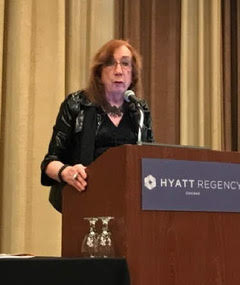
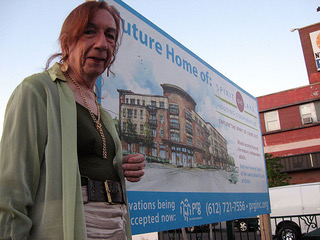
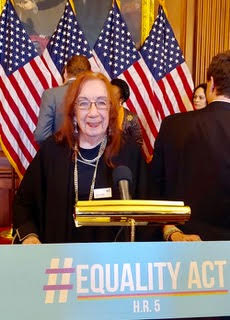
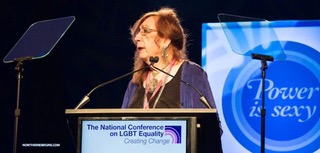
Here at Queer Forty we try to give voices to the LGBTQ generations over 40 while trying to maintain a connection with those younger. Our community has achieved a lot but there is still a way to go. What gives you hope that those coming after us will achieve what we need to achieve to minimize suffering and gain equality?
I live in Minnesota, the first state (1993) of the now 21 states where being trans is a protected identity – but as freeing as that is, it is like living in Oz and knowing that traveling to or through any of the 28 states where those protections are absent is like Dorothy being swept back to Kansas — and the Kansas analogy is, unfortunately, both accurate and appropriate.
The road to that “success” has been rocky and filled with pot-holes as we continue to experience anti-trans legislation in local and state governmental arenas. Of the nearly two hundred state legislative initiatives aimed at curtailing LGBTQ rights, a majority of these are aimed at the trans and gender non-conforming community. The “Don’t Say Gay” bills in Southern states is just the latest effort to erase our identity and our authenticity.
Adding to the trauma and distress, Texas is leading the way toward treating any effort to provide support or care to trans people, young or old, as a criminal offense punishable with imprisonment whether you are a parent or a professional care giver.
The LGBTQ environment in many states is deeply toxic, both politically and rhetorically, and the impact on a younger generation of queer people is devastating.
For many, this is a new experience, they have seen and read so much about the changing attitudes in America toward the LGBTQ community — positive and seemingly affirming — a new day for gay and trans folks. Now, to see state and local politicians finding new, horrendous ways to make our queer lives more difficult and treacherous is disabling and fearful.
The future of LGBTQ human rights protections in this country rests in the bill now sitting in the U.S. Senate — the Equality Act. It offers the protections I live with in Minnesota and provides them across all state lines. Kansas — and Texas and Florida, etc. — will no longer exist to strangle the beauty and potential of young queer folks nor distress the well-deserved golden years of our old LGBTQ pioneers.
Get political, get your Senators to vote “yes” on the Equality Act.

